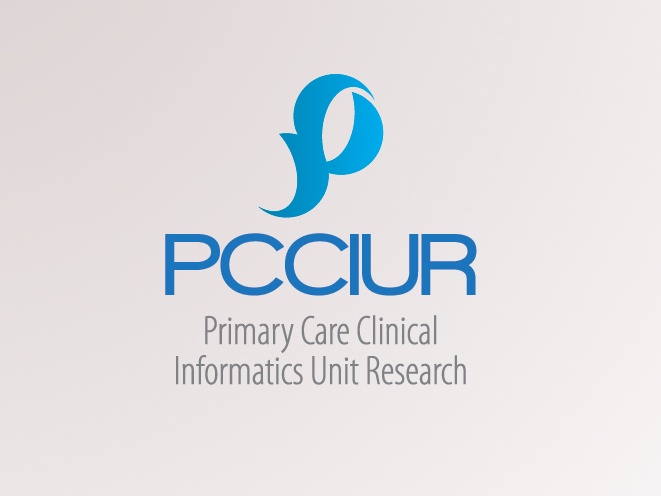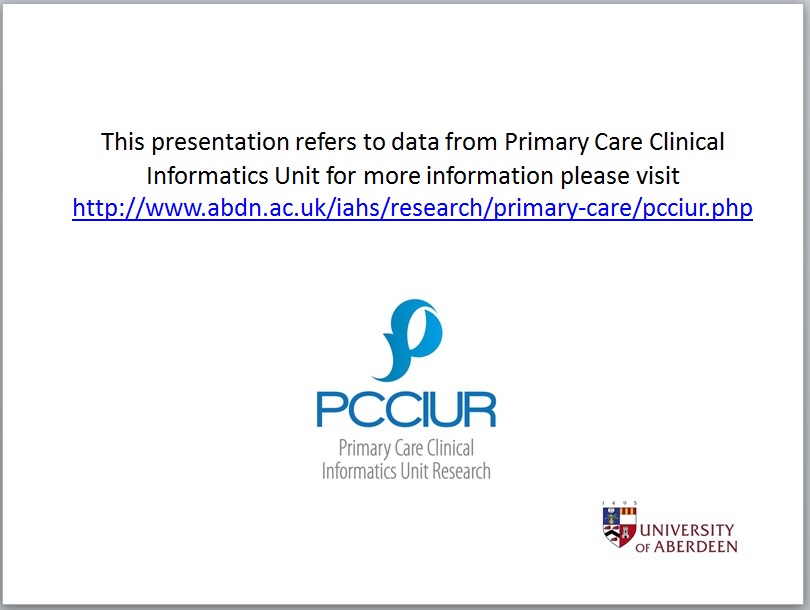
Founded in 1999...
PCCIU is the first Scottish Primary Care dataset. PCCIUR is responsible for research projects that use PCCIU data
The Primary Care Clinical Informatics Unit (PCCIU) was founded in 1999 to provide a reporting service to Scottish General Practice in collaboration with Royal College of General Practitioners (RCGP ) Scotland as part of their Clinical Effectiveness Programme to collect Practice data and to produce SPICEpc reports to Practices, Community Health Partnerships (CHPs) and Health Boards for the SPICEpc project. PCCIU collected Practice data for the SPICEpc Programme bi-annually in spring and autumn between 2000 and 2011. The collected data for each season was amalgamated to a single seasonal general practice database. Each seasonal database contains all data recorded into GPASS up to the date of extraction from the Practice. All our seasonal databases can be used to provide datasets to PCCIU approved researchers.
Between May 1996 and September 2000 a Monthly Bulletin was sent to Practices. These were for specific clinical topics, based on data collected from Practices by the Electronic Questionnaire (EQ) software. During this period, The GPASS Data Evaluation Project (GDEP) conducted three National surveys on the state of computerisation in Scottish Primary Care.
PCCIU was formerly known as the GPASS Data Evaluation Project (GDEP). GDEP was founded in 1987 to determine the level and range of usage of GPASS by Practices. GDEP developed the Electronic Questionnaire software to collect anonymous patient clinical and registration data to Aberdeen for analyses. All practices' results were collated and various reports were produced and issued to Practices and Health Boards.
Between 1994 and 1995 GDEP developed a prototype of a standardised Practice Health Profile to allow Practices to compare their own health needs and performance with similar data from local, regional and national sources. The prototype was implemented and tested in two pilot Grampian Practices. In this period, GDEP also developed two searching programs, Practice Reports Utility (PRU) and Practice Analysis Tool (PAT) to provide fast searching on the GPASS system.
In 1993 GDEP initiated the Continuous Morbidity Recording project, supported by ISD (Information and Statistics Division, National Services Scotland). This project recruited about 60 Practices, throughout Scotland, representing most types of locality and deprivation. Every clinical encounter was recorded into GPASS with a suitable Read code and an indication of first, recurrent or new. GDEP recruited the Practices and developed a data collection system and processing for its first years. This Project is now called Practice Team Information (PTI), operated by ISD.
Find out more about the data we collected, visit the PCCIU Data page .
Contact: researchapps@abdn.ac.uk
The Research Applications and Data Management team is responsible for the provision of PCCIUR datasets to researchers.
The team is supported by the College of Life Science and Medicine (CLSM) but comes under IT Services (ITS) - we provide data management services to researchers within the University, NHS Grampian and other external customers.
We offer the following: Consultancy, Project Management, Record Linkage, Anonymisation service, Data Hosting, Database Design, Database Support and/or Development, Data Analysis and Web Applications.
Web: www.abdn.ac.uk/it/services/data-management
Email: researchapps@abdn.ac.uk
Our data collection is reliant on the data entry systems and completeness within our contributing Practices. Some of these Practices may be 'paperlight' with more complete data entry relating to consultations. The majority will utilise a mixed system of computer and paper recording.
Prescription data and diagnosis coding for Clinical summaries is expected to be quite complete, particularly looking back over the last 10 years. In addition, from 2003, items relating to QOF will be well recorded.
Data relating to consultations and types of encounters are collected but is expected that this data may be less accurate.
We do not collect patient or clinician identifiable data, nor do we collect any free text (clinical notes).
We have collected clinical data from general practice for several years. Subsets of these data are available (subject to approval and by following the PCCIUR application process ).
| Dataset | Total Practices |
| Spring 2007 | 318 |
| Autumn 2007 | 272 |
| Spring 2008 | 240 |
| Autumn 2008 | 212 |
| Spring 2009 | 191 |
| Autumn 2009 | 178 |
| Spring 2010 | 173 |
| Autumn 2010 | 133 |
We combined the latest data we received from each Practice since spring 2007 into a single dataset. There are 393 Practices. Using this dataset, we identified the following numbers of patients registered for at least one day in the time period given.
| Search | StartDate | EndDate | Practices | Patients |
| QOF Year 2010/11 | 01/04/2010 | 31/03/2011 | 54 | 317,392 |
| QOF Year 2009/10 | 01/04/2009 | 31/03/2010 | 172 | 1,069,264 |
| QOF Year 2008/09 | 01/04/2008 | 31/03/2009 | 241 | 1,487,581 |
| QOF Year 2007/08 | 01/04/2007 | 31/03/2008 | 292 | 1,723,680 |
| QOF Year 2006/07 | 01/04/2006 | 31/03/2007 | 368 | 2,191,185 |
| Calendar Year 2010 | 01/01/2010 | 31/12/2010 | 87 | 551,837 |
| Calendar Year 2009 | 01/01/2009 | 31/12/2009 | 194 | 1,232,709 |
| Calendar Year 2008 | 01/01/2008 | 31/12/2008 | 244 | 1,508,304 |
| Calendar Year 2007 | 01/01/2007 | 31/12/2007 | 299 | 1,744,349 |
| Calendar Year 2006 | 01/01/2006 | 31/12/2006 | 393 | 2,311,937 |
The number of Practices contributing data to a given time period varies as the data were collected from Practices during different seasons and years. This is why fewer or more patients are found for similar time periods. The table below shows the number of Practices from the combined dataset with complete data recorded up to the given season.
| Season | Practices |
| Spring 2007 | 393 |
| Autumn 2007 | 336 |
| Spring 2008 | 299 |
| Autumn 2008 | 267 |
| Spring 2009 | 244 |
| Autumn 2009 | 220 |
| Spring 2010 | 194 |
| Autumn 2010 | 139 |
| Spring 2011 | 87 |
The PCCIUR team welcomes funded applications from individuals and organisations to use PCCIUR data for research purposes.
Please email researchapps@abdn.ac.uk in the first instance to discuss your research proposal. This will enable a quick assessment of whether our database is suitable to meet your needs.
This Template Protocol should be completed and submitted according to the Process Flowchart . A standard approach is used for the submission of all protocols for the use of PCCIUR data (including internal submissions from within the University of Aberdeen) and all applications undergo the same peer review process.
It normally takes between 3-4 months from submission of a protocol until the data are released for analysis.
A cost assessment is undertaken for each protocol submitted for use of PCCIUR data. These costs are to recover staff costs incurred with the development, preparation and supply of data. These costs include a small administrative charge and are subject to VAT.
Protocols submitted by applicants within the University of Aberdeen are also subject to the same costs as those from external applicants, except that no VAT will be charged.
Data will not be released to applicants until the University of Aberdeen has received appropriate payment.
All researchers wishing to use PCCIU data should first contact PCCIU to discuss their proposal and then afterwards complete a protocol and submit it. For more information, visit the Accessing the Data page .
The PCCIUR Steering Group was re-established in 2009 to ensure that procedures and protocols are put in place for good working practice and appropriate usage/dissemination of PCCIUR data.
Please include the slide below with any documentation or presentation which refers to PCCIUR data.

Download the slide in Powerpoint by clicking this link... PCCIUR Acknowledgement Slide .
Glossary items in italics are no longer active.
| CHI | Community Health Index |
| CHP | Community Health Partnership |
| CLSM | College of Life Sciences & Medicine, University of Aberdeen |
| ITS | IT Services, University of Aberdeen |
| RADMT | Research Applications and Data Management Team, University of Aberdeen |
| EMIS | Egton Medical Information Systems |
| GPASS | General Practice Administration System for Scotland |
| ISD | Information Services Division of National Services Scotland |
| PCCIUR | PCCIU Research, University of Aberdeen |
| PTI | Practice Team Information |
| QIS | Quality Improvement Scotland |
| QOF | Quality and Outcomes Framework |
| Read Codes | Read Codes are a coded thesaurus of clinical terms |
| RCGP Scotland | Royal College of General Practitioners Scotland |
| SIGN | Scottish Intercollegiate Guidelines Network |
| SPICEpc | Scottish Programme for Improving Clinical Effectiveness in Primary Care |
| CMR | Continuous Morbidity Recording |
| GDEP | GPASS Data Evaluation Project |
| PAT | Practice Analysis Tool |
| PCCIU | Primary Care Clinical Informatics Unit, University of Aberdeen |
| PRU | Practice Report Utility |
Katie Wilde (Research Manager)
Tel: 01224 437042
Email: digitalresearch@abdn.ac.uk
Mr Derek Turner (Business Manager)
Tel: 01224 437253
digitalresearch@abdn.ac.uk